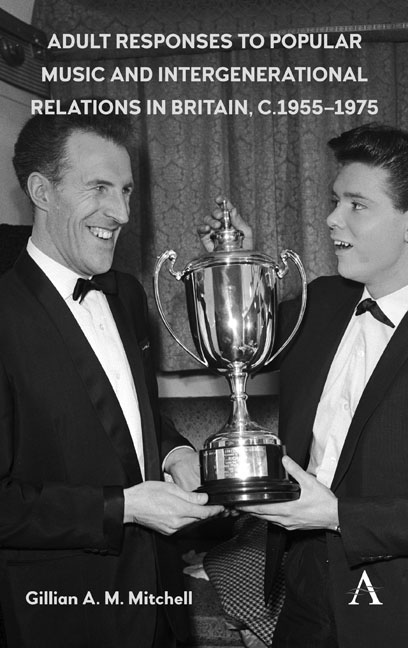Book contents
- Frontmatter
- Contents
- Acknowledgements
- Introduction
- Chapter One ‘You Go Half Way, Don't You?’ Family Life, Generational Identity and Popular Music
- Chapter Two ‘To Have Done Something’: The Christian Churches, Youth Clubs and Popular Music
- Chapter Three ‘You've Got to Be Able to Entertain People’: The Encounter between Popular Music and the Worlds of Variety and ‘Light Entertainment’
- Conclusion
- Notes
- Bibliography
- Index
Chapter One - ‘You Go Half Way, Don't You?’ Family Life, Generational Identity and Popular Music
Published online by Cambridge University Press: 27 March 2019
- Frontmatter
- Contents
- Acknowledgements
- Introduction
- Chapter One ‘You Go Half Way, Don't You?’ Family Life, Generational Identity and Popular Music
- Chapter Two ‘To Have Done Something’: The Christian Churches, Youth Clubs and Popular Music
- Chapter Three ‘You've Got to Be Able to Entertain People’: The Encounter between Popular Music and the Worlds of Variety and ‘Light Entertainment’
- Conclusion
- Notes
- Bibliography
- Index
Summary
Introduction
Many of the memories of Cheryl Vines, interviewed for the BBC's Millennium Memory Bank oral history project in 1999, seemed fairly typical of those of the generation which matured in the late 1950s and early 1960s, but she had one particularly unusual anecdote to share. In 1963, Vines won a competition to meet the Beatles, becoming the envy of her peers as she did so. The occasion was featured in the local press, and it proved an unforgettable experience for Vines. Nevertheless, although she was an avid Beatles fan, she also stressed that her love for the group had originated not so much in deep- seated enjoyment of their music or personalities, but, rather, in a desire to be different from her older sister. When her sister ‘took up the rock ‘n’ roll craze with a vengeance’, she had deliberately avoided doing so, because she always did ‘the opposite’ of whatever her sister chose to do. Eventually, however, she decided to embrace Cliff Richard – albeit expressly because her sister had admired Elvis Presley – and later she turned to the Beatles because ‘they were mine, they weren't [my sister's] – she'd kind of moved on’. Vines became a typical Beatles devotee, filling drawers with memorabilia and cultivating a particular love for Paul McCartney. On entering the competition to meet the group, she longed to win and harboured a strong conviction that she would succeed. Again, however, her motivations for participating were mixed – she was clearly a Beatles devotee, but equally she hoped to supersede a classmate who had simultaneously entered a similar competition, organized by Radio Luxembourg. Vines could not remember whether her sister had delighted in her victory – having ‘left home […] she was not particularly interested’ – but her mother, she expressly recalled, had ‘shared [her] joy’. The experience of meeting the Beatles had been exciting – and her favourite, McCartney, had been ‘very pleasant’. However, inevitably, life moved on for Vines, and she eventually became an art student, embracing the ethos of the 1960s as wholeheartedly as possible. ‘We really did think we could change the world’, she said of her generation, and, while attending college in London, she recalled experiencing a particularly enriched ‘freedom’.
- Type
- Chapter
- Information
- Adult Responses to Popular Music and Intergenerational Relations in Britain, 1955–1975 , pp. 15 - 64Publisher: Anthem PressPrint publication year: 2019



